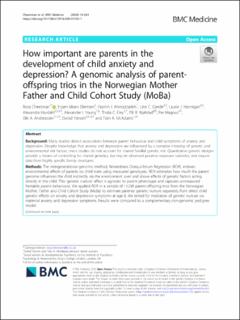| dc.contributor.author | Cheesman, Rosa | |
| dc.contributor.author | Eilertsen, Espen Moen | |
| dc.contributor.author | Ahmadzadeh, Yasmin I. | |
| dc.contributor.author | Gjerde, Line C. | |
| dc.contributor.author | Hannigan, Laurie John | |
| dc.contributor.author | Havdahl, Alexandra | |
| dc.contributor.author | Young, Alexander I. | |
| dc.contributor.author | Eley, Thalia C. | |
| dc.contributor.author | Njølstad, Pål Rasmus | |
| dc.contributor.author | Magnus, Per | |
| dc.contributor.author | Andreassen, Ole Andreas | |
| dc.contributor.author | Ystrøm, Eivind | |
| dc.contributor.author | McAdams, Tom A. | |
| dc.date.accessioned | 2021-05-04T07:37:33Z | |
| dc.date.available | 2021-05-04T07:37:33Z | |
| dc.date.created | 2020-11-09T11:50:45Z | |
| dc.date.issued | 2020 | |
| dc.Published | BMC Medicine. 2020, 18:284 1-11. | |
| dc.identifier.issn | 1741-7015 | |
| dc.identifier.uri | https://hdl.handle.net/11250/2753393 | |
| dc.description.abstract | Background
Many studies detect associations between parent behaviour and child symptoms of anxiety and depression. Despite knowledge that anxiety and depression are influenced by a complex interplay of genetic and environmental risk factors, most studies do not account for shared familial genetic risk. Quantitative genetic designs provide a means of controlling for shared genetics, but rely on observed putative exposure variables, and require data from highly specific family structures.
Methods
The intergenerational genomic method, Relatedness Disequilibrium Regression (RDR), indexes environmental effects of parents on child traits using measured genotypes. RDR estimates how much the parent genome influences the child indirectly via the environment, over and above effects of genetic factors acting directly in the child. This ‘genetic nurture’ effect is agnostic to parent phenotype and captures unmeasured heritable parent behaviours. We applied RDR in a sample of 11,598 parent-offspring trios from the Norwegian Mother, Father and Child Cohort Study (MoBa) to estimate parental genetic nurture separately from direct child genetic effects on anxiety and depression symptoms at age 8. We tested for mediation of genetic nurture via maternal anxiety and depression symptoms. Results were compared to a complementary non-genomic pedigree model.
Results
Parental genetic nurture explained 14% of the variance in depression symptoms at age 8. Subsequent analyses suggested that maternal anxiety and depression partially mediated this effect. The genetic nurture effect was mirrored by the finding of family environmental influence in our pedigree model. In contrast, variance in anxiety symptoms was not significantly influenced by common genetic variation in children or parents, despite a moderate pedigree heritability.
Conclusions
Genomic methods like RDR represent new opportunities for genetically sensitive family research on complex human traits, which until now has been largely confined to adoption, twin and other pedigree designs. Our results are relevant to debates about the role of parents in the development of anxiety and depression in children, and possibly where to intervene to reduce problems. | en_US |
| dc.language.iso | eng | en_US |
| dc.publisher | BMC | en_US |
| dc.rights | Navngivelse 4.0 Internasjonal | * |
| dc.rights.uri | http://creativecommons.org/licenses/by/4.0/deed.no | * |
| dc.title | How important are parents in the development of child anxiety and depression? A genomic analysis of parent-offspring trios in the Norwegian Mother Father and Child Cohort Study (MoBa) | en_US |
| dc.type | Journal article | en_US |
| dc.type | Peer reviewed | en_US |
| dc.description.version | publishedVersion | en_US |
| dc.rights.holder | Copyright 2020 The Authors | en_US |
| dc.source.articlenumber | 284 | en_US |
| cristin.ispublished | true | |
| cristin.fulltext | original | |
| cristin.qualitycode | 2 | |
| dc.identifier.doi | 10.1186/s12916-020-01760-1 | |
| dc.identifier.cristin | 1846096 | |
| dc.source.journal | BMC Medicine | en_US |
| dc.source.40 | 18:284 | |
| dc.identifier.citation | BMC Medicine. 2020, 18, 284 | en_US |
| dc.source.volume | 18 | en_US |

